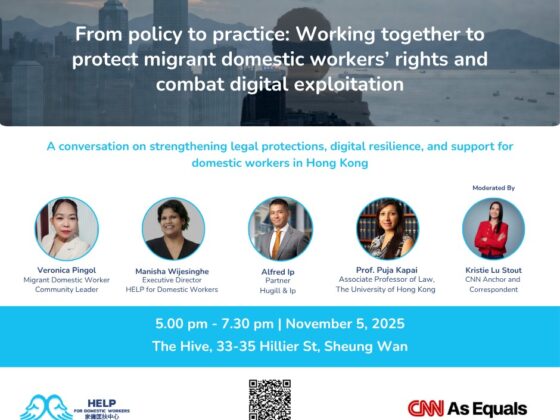The afternoon session of Inspire HR 2025 delivered compelling discussions on the evolving landscape of human resources, focusing on the critical balance between technological advancement and human-centred workplace experiences. Following a networking lunch that energised attendees, the programme resumed with two pivotal sessions that addressed some of the most pressing challenges facing HR professionals today.
The day’s highlight began with an engaging panel discussion titled “Designing Employee Experience for a Digital-First World,” expertly moderated by Tracy Chan from HRO. The distinguished panel brought together industry leaders with diverse perspectives on creating meaningful employee experiences in an increasingly digital workplace environment.
Joseph Ng, Director of Talent & Culture at Accor The Silveri MGallery & Novotel Citygate, shared insights from the hospitality sector’s unique approach to balancing digital efficiency with personalised service excellence. The Regional HR Director for APAC at L’OCCITANE Group provided valuable perspectives on integrating sustainability and digital transformation within HR practices. while the Director of Business Development for Career Consulting at Mercer Hong Kong contributed strategic insights on leveraging technology to enhance career development and employee engagement.
The panel explored the fundamental challenge of creating high-touch experiences that successfully bridge digital capabilities with emotional intelligence, reimagining traditional HR processes such as onboarding, performance feedback, and employee recognition through a distinctly human-first lens. Their discussion illuminated practical strategies for maintaining authentic connections whilst embracing digital transformation.
The conference concluded with a keynote address from Adam Hugill, Partner and Employment Law Specialist at Hugill & Ip, who delivered an authoritative presentation on “Building HR Resilience in the Changing Legal Landscape in Hong Kong.” Hugill’s comprehensive overview provided attendees with essential insights into navigating the increasingly complex intersection of legal compliance, evolving workforce expectations, and operational excellence that defines contemporary HR practice.
These final sessions encapsulated the core themes of Inspire HR 2025, demonstrating how forward-thinking organisations can successfully integrate technological innovation with human-centred approaches whilst maintaining robust legal compliance and operational resilience.
Building HR Resilience in the Changing Legal Landscape in Hong Kong
Future-Proofing HR: Essential Employment Law Strategies for Hong Kong’s Evolving Landscape
Hong Kong’s employment landscape is undergoing significant evolution, demanding proactive engagement from HR and legal professionals. As an employment lawyer, it’s clear that staying abreast of these changes is crucial for compliance and competitive advantage.
Key legislative shifts include the abolition of the MPF Offsetting Mechanism from 1 May 2025, which fundamentally alters severance and long service payment calculations. Additionally, the “468 Rule” will replace the “418 Rule” from 18 January 2026, lowering the eligibility threshold for statutory benefits and expanding protections for part-time workers. These changes necessitate immediate reviews of existing policies and contracts.
The city is also actively attracting global talent through expanded immigration schemes and promoting workplace diversity, evidenced by new EOC guidance and the HKEX’s mandate for gender-diverse boards from 1 January 2025.
Restrictive covenants face rigorous judicial scrutiny. Courts demand proportionality and a demonstrable legitimate business interest, with recent cases highlighting that broad, untailored restrictions are unlikely to be upheld. Furthermore, the understanding of fiduciary duties is expanding beyond traditional director roles.
In compensation and termination, summary dismissal carries a high burden of proof, reserved for fundamental contract breaches. Employers retain discretion over bonuses if decisions are well-documented, and the implications of payment in lieu of notice on deferred compensation must be carefully managed.
Finally, technology’s impact is profound. AI in recruitment and monitoring raises concerns about bias and privacy, requiring robust governance frameworks. While wages must be paid in legal tender, the distinction between “wages” and “bonuses” offers scope for offering cryptocurrency-based bonuses, despite stablecoins not achieving legal tender status.
Organisations must proactively engage with these developments. Seeking expert legal advice is not merely reactive but a strategic imperative to ensure robust, future-proofed HR strategies in Hong Kong.
For further information about HR-related conferences in the region, you can check the dedicated section in HRO website




